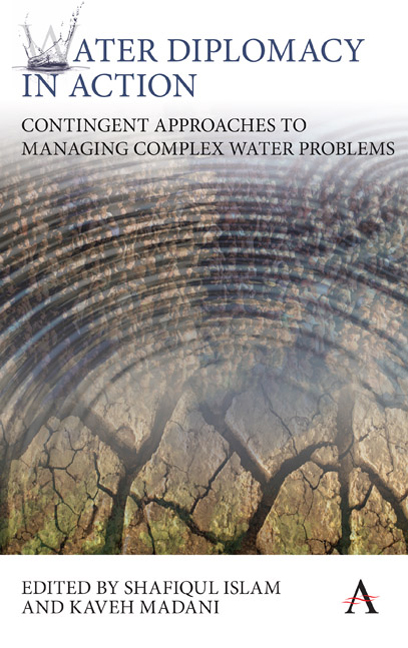Book contents
- Frontmatter
- Contents
- List of Figures
- List of Tables
- The Blind Men, the Elephant and the Well: A Parable for Complexity and Contingency
- Preface
- Part I ROOTS AND CAUSES OF COMPLEXITY AND CONTINGENCY IN WATER PROBLEMS
- Chapter One Complexity and Contingency: Understanding and Managing Complex Water Problems
- Chapter Two Leveraging Diplomacy for Resolving Transboundary Water Problems
- Part II TOOLS, TECHNIQUES, MODELS AND ANALYSES TO RESOLVE COMPLEX WATER PROBLEMS
- Part III CASE STUDIES
- Notes on Contributors
- Index
Chapter One - Complexity and Contingency: Understanding and Managing Complex Water Problems
from Part I - ROOTS AND CAUSES OF COMPLEXITY AND CONTINGENCY IN WATER PROBLEMS
Published online by Cambridge University Press: 10 January 2018
- Frontmatter
- Contents
- List of Figures
- List of Tables
- The Blind Men, the Elephant and the Well: A Parable for Complexity and Contingency
- Preface
- Part I ROOTS AND CAUSES OF COMPLEXITY AND CONTINGENCY IN WATER PROBLEMS
- Chapter One Complexity and Contingency: Understanding and Managing Complex Water Problems
- Chapter Two Leveraging Diplomacy for Resolving Transboundary Water Problems
- Part II TOOLS, TECHNIQUES, MODELS AND ANALYSES TO RESOLVE COMPLEX WATER PROBLEMS
- Part III CASE STUDIES
- Notes on Contributors
- Index
Summary
Abstract
While classical scientific methods seek generalizable and predictable solutions, these methods do not work for complex problems where solution spaces are neither well bounded nor predictable. A key challenge for many water problems— such as allocation between competing uses, providing access to water in urban slums or creating watersharing arrangements between riparian countries— is that outcomes from interventions are not predictable due to the dynamic nature of interactions and interdependencies of complex water systems. An interdisciplinary understanding of different schools of thought from complexity science can provide a pragmatic way to diagnose sources of complexity, identify intervention points and develop equitable and sustainable solutions for complex water- management problems. Here we provide an overview of key concepts from complexity science and use a case example to illustrate how to operationalize complexity thinking to address a complex water allocation problem. This case example of water sharing between Israel and Jordan demonstrates how the creation of an actionable space with a commitment to collaborative adaptive management can produce a relatively sustainable water agreement. To manage complex water problems, we need to reframe traditional specify- design- implement to a try- select- adapt management approach. Instead of searching for optimal solutions to address complex problems we need to look for optimal space where certain solutions are actionable given the constraints the context imposes.
Introduction
This introductory chapter is intended to provide a broad overview of complexity science from multiple domains of knowledge (e.g., Anderson et al. 1988; Nicolis and Prigogine 1989; Lewin 1992; Kauffman 1993; Mainzer 1994; Bar- Yam 1997; Cilliers 1998; Maguire et al. 2006; Maguire 2011). A cursory look around this vast body of literature in complexity sciences shows incredible diversity in terms of ontological and epistemological assumptions, foundational concepts, levels of analysis, research methods and so on. Clearly, there are important differences among the approaches followed by disciplinary groups but, among these examples, the within- group differences are much smaller compared to the differences between groups. In this chapter we focus on broad ways of thinking about the different faces of complexity: numbers and narratives; models and meanings; objective and interpretive.
- Type
- Chapter
- Information
- Water Diplomacy in ActionContingent Approaches to Managing Complex Water Problems, pp. 3 - 18Publisher: Anthem PressPrint publication year: 2017



